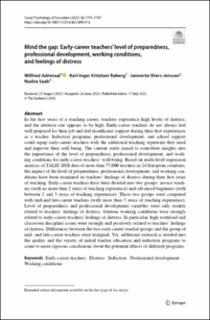| dc.contributor.author | Admiraal, Wilfried | |
| dc.contributor.author | Røberg, Karl Ingar Kittelsen | |
| dc.contributor.author | Wiers-Jenssen, Jannecke | |
| dc.contributor.author | Saab, Nadira | |
| dc.date.accessioned | 2024-01-08T10:03:32Z | |
| dc.date.available | 2024-01-08T10:03:32Z | |
| dc.date.created | 2023-07-17T20:48:22Z | |
| dc.date.issued | 2023 | |
| dc.identifier.citation | Social Psychology of Education. 2023, 26 (5), 1759-1787. | en_US |
| dc.identifier.issn | 1381-2890 | |
| dc.identifier.uri | https://hdl.handle.net/11250/3110329 | |
| dc.description.abstract | In the first years of a teaching career, teachers experience high levels of distress, and the attrition rate appears to be high. Early-career teachers do not always feel well prepared for their job and feel insufficient support during their first experiences as a teacher. Induction programs, professional development, and school support could equip early-career teachers with the additional teaching repertoire they need and improve their well-being. The current study aimed to contribute insights into the importance of the level of preparedness, professional development, and working conditions for early-career teachers’ well-being. Based on multi-level regression analysis of TALIS 2018 data of more than 77,000 teachers in 24 European countries, the impact of the level of preparedness, professional development, and working conditions have been examined on teachers’ feelings of distress during their first years of teaching. Early-career teachers have been divided into two groups: novice teachers (with no more than 2 years of teaching experience) and advanced beginners (with between 2 and 5 years of teaching experience). These two groups were compared with mid-and late-career teachers (with more than 5 years of teaching experience). Level of preparedness and professional development variables were only weakly related to teachers’ feelings of distress, whereas working conditions were strongly related to early-career teachers’ feelings of distress. In particular, high workload and classroom discipline issues were strongly and positively related to teachers’ feelings of distress. Differences between the two early-career teacher groups and the group of mid- and late-career teachers were marginal. Yet, additional research is needed into the quality and the variety of initial teacher education and induction programs to come to more rigorous conclusions about the potential effects of different programs. | en_US |
| dc.language.iso | eng | en_US |
| dc.title | Mind the gap: Early-career teachers’ level of preparedness, professional development, working conditions, and feelings of distress | en_US |
| dc.title.alternative | Mind the gap: Early-career teachers’ level of preparedness, professional development, working conditions, and feelings of distress | en_US |
| dc.type | Peer reviewed | en_US |
| dc.type | Journal article | en_US |
| dc.description.version | publishedVersion | en_US |
| dc.source.pagenumber | 1759-1787 | en_US |
| dc.source.volume | 26 | en_US |
| dc.source.journal | Social Psychology of Education | en_US |
| dc.source.issue | 5 | en_US |
| dc.identifier.doi | 10.1007/s11218-023-09819-6 | |
| dc.identifier.cristin | 2162611 | |
| cristin.ispublished | true | |
| cristin.fulltext | original | |
| cristin.fulltext | original | |
| cristin.fulltext | original | |
| cristin.qualitycode | 2 | |
